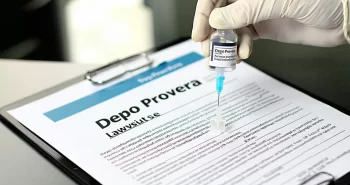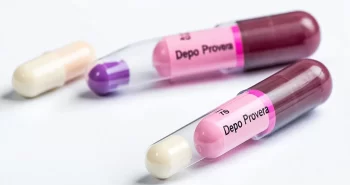Depo‑Provera Restrictions by Country
 Fact Checked By Our Attorneys
Fact Checked By Our Attorneys

Depo Provera banned claims are now being raised by patients who allege serious injuries linked to the injection. Lawsuits focus on whether manufacturers failed to warn about known risks despite prior restrictions and bans. These claims are legal in nature and do not provide medical advice. This page explains when Depo Provera ban history may support a legal claim.
Table of Contents:


Depo Provera Restrictions Cited in Legal Claims
You might be curious about where Depo Provera, the contraceptive injection, stands on a global scale. Some countries have said, “Hold up, we gotta rethink this,” and taken actions to restrict or put a full stop to its use, mostly due to health worries. Here’s a quick look at who’s doing what:
| Country | Status & Action |
|---|---|
| United States | Gave it the boot in ’78, but let it back in with rules by ’92 (Human Life International) |
| Britain | Only for special cases where it’s monitored like a hawk (PubMed) |
| Canada | Shut it down a year after the U.S. ban because it didn’t meet the safety bar for birth control (Human Life International) |
These moves make it clear that there are serious health concerns buzzing around Depo Provera. If you’re considering this option, knowing these actions might make you think twice.
Now, if you want to dig into the nitty-gritty—like what exactly got these countries spooked or which studies raised red flags—you’d have to snoop around a bit more. Plus, how governments and health experts reacted to these medical alarms is worth knowing, especially if you’re trying to figure out your options. And if Depo Provera has made things rocky for you and you’re thinking about taking it to court, our article on how to file a Depo Provera lawsuit could be your next pit stop.
Risks Alleged in Depo Provera Lawsuits
Why did Depo-Provera face bans left and right? Well, dig into the heap of health worries tied to this contraceptive, and you’ll uncover some pretty hairy issues that got folks worked up worldwide. These concerns, backed by studies, reports, and clamors for action, drove officials to pump the brakes on Depo-Provera.
Carcinogenic Concerns
Top of the list was the cancer scare. Back in ’78, the U.S. said hard pass to Depo-Provera due to its suspected connection to cancer. The FDA sounded the alarm about the pill potentially being a cancer culprit. Our folks weren’t alone; worldwide, the worries spread faster than gossip at a high school reunion, leading to tight controls on its use.
Meningioma Madness
Fast forward a bit, and researchers dug up another scary nugget: a link between long-term use of Depo-Provera and a sky-high shot at getting meningiomas, a nasty brain tumor. A March 2024 study revealed that folks hooked on Depo-Provera ended up being 5.6 times more likely to develop these tumors than those who steered clear (Shapiro Legal Group). That kind of risk isn’t exactly what anyone signed up for when choosing their birth control, is it?
STD Skyrocket
Oh, and adding fuel to the fire, there were whispers (well, more like sirens) that Depo-Provera users found themselves a little more buddy-buddy with STDs. Despite behavioral factors being mixed into the equation, the numbers strongly suggested an upswing in STD risks (Human Life International). Not exactly a friendly side effect.
Legal Storm
With so many health downsides hanging over Depo-Provera, law firms jumped onboard. Teams like Shapiro Legal Group, PLLC have been busy, rolling up sleeves and investigating claims. With legal actions aplenty, they’re swinging hard to get victims their due – compensation for everything from medical bills to lost income and more (Shapiro Legal Group).
All this tumbling of questions and controversies about Depo-Provera got the medical world buzzing and regulators re-evaluating its safety. For those who faced the side effects, there are open doors: reach out to the docs, see what legal steps can be taken, and maybe even file a Depo-Provera lawsuit to snag some justice and compensation.
Evidence Referenced in Depo Provera Litigation
To really get a sense of why Depo-Provera got the boot in some places, let’s check out the beefy studies and reports that pushed those regulators to say, “Hold up, wait a minute.” These documents spilled the beans on what could go wrong with using Depo-Provera.
Cancer Scares and Ban Hammers
Flashback to 1978. The U.S. slapped down a ban on Depo-Provera, all because folks were fretting about cancer risks (PubMed). Our powers-that-be made this call after experts dropped some heavyweight research showing this contraceptive might not be all sunshine and roses.
Meningiomas: The Unwanted Brain Guests
Fast forward to more recent times, and concerns about Depo-Provera aren’t exactly dwindling. A study flagged a 53% spike in the risk of meningiomas—those pesky brain tumors—after using Depo-Provera. To add fuel to the fire, a March 2024 study cranked up the panic by showing these brain blips were 5.6 times more likely in those sticking with Depo-Provera long-term compared to the rest of us who took a pass.
Mix-Ups and Political Oopsies
Then there’s the confusion trip. Some political moves based on misunderstood science piggybacked on misconceptions about how contraceptives like Depo-Provera do their thing. In Kentucky’s 2023 governor showdown, a candidate pushed for fetal rights, but this tactic stirred the pot by trying to lump Depo-Provera under this category, showing a big ol’ misreading of what these drugs actually do (KFF).
How Depo-Provera Blocks Baby-Making
Scientifically speaking, Depo-Provera does a bang-up job of halting ovulation. One study found that among 38 women, ovulation was kept at bay up to seven and a half months after a 150 mg injection. This proves just how strong the drug is in stalling egg release (NCBI).
These crucial pieces of research have led regulators to hit the reset button on the safety and use of Depo-Provera as a go-to contraceptive. The pile of evidence growing behind this discussion highlights just how vital it is for decisions to be calculated with caution paired with up-to-date info about Depo-Provera.
Serious Injury Allegations in Depo Provera Claims
When I began exploring the connection between Depo-Provera and various health issues, it became apparent that this contraceptive injection raised some serious eyebrows due to possible dangerous side effects. One of the most unsettling discussions revolves around its potential link with the development of meningioma tumors. Yep, that sounds like a big deal (Weitz & Luxenberg).
Experts have been ringing alarm bells about a notable increase in meningioma risk for folks using Depo-Provera. Let me break it down: a particular study found that users faced a 5.55 times higher chance of getting meningiomas than those who didn’t. That’s a huge jump! This makes it the birth control with the most significant risk hanging over it compared to the other options out there. Plus, another analysis showed a major 53% increase in tumor risk following these injections. It’s a vivid link between this shot and brain tumors (Robert King Law Firm).
Adding more concern, there was a recent study in March 2024 that highlighted an overwhelming 5.6 times greater likelihood of developing meningiomas among long-term users of Depo-Provera. This risk-shot up even more than any other examined contraceptive method, raising serious questions and concerns about its safety.
Faced with such severe health concerns, many people affected have decided to take Pfizer, the manufacturer of the contraceptive, to court. They’re suiting up and filing lawsuits, accusing the company of not giving enough heads-up about the brain tumor risks that come with this shot (Shapiro Legal Group). If you or someone you care about has felt the sting of Depo-Provera’s serious side effects, it’s smart to seek legal help. Make sure you know your rights and the ways you might find a remedy.
Regulatory History Used in Lawsuit Arguments
After the buzz around health issues linked to Depo-Provera caught everyone’s attention, governments all over the globe had some choices to make. They had to figure out how to handle the fuss linked to the legal and medical mishaps of this contraceptive shot.
The United States
Back in 1992, the FDA went ahead and stamped approval on Depo-Provera for Americans, and this stirred the pot quite a bit. Some groups weren’t thrilled about it at all, leading to a fierce tug-of-war between pro-life voices and pro-abortion advocates (Human Life International). The FDA’s nod to Depo-Provera wasn’t exactly smooth sailing—there were plenty of eyebrows raised over its safety and moral implications. Even with the green light, whispers of worry about the risks hung around, steering both public chat and policymakers into deeper thought.
Other Countries
Taking a different route, Canada hit the brakes on Depo-Provera in 1993. Their Health and Welfare Department decided it just didn’t pass the safety test for a birth control method. This decision lit up the spotlight on how different countries were treating the risks and rewards of Depo-Provera differently.
Legal and Policy Responses
In the aftermath, a bunch of U.S. states rolled up their sleeves and made moves to lock in the right to birth control. States like California, Colorado, and a few others beefed up their laws or set new rules to ensure folks could keep their hands on contraceptives (KFF).
On top of that, some federal players threw bills like the Right to Contraception Act into the mix, trying to cement the freedom to choose contraceptives. But getting everyone on board in Congress turned out to be a real head-scratcher, making federal regulations on birth control a tricky puzzle to solve.
To wrap it up, governments danced to different tunes in tackling the Depo-Provera conundrum. These varied responses highlight the dance between science, public health, legal norms, and how society views reproductive health—a mix of tricky balancing acts with no one-size-fits-all answer.
FDA Approval History and Legal Implications
Curious about Depo Provera’s standing in the United States? Well, here’s the scoop. This contraceptive shot got the green light from the U.S. Food and Drug Administration (FDA) back in October 1992, and it’s been a prominent choice ever since. Each year, between one and two million women in America embrace Depo Provera, making up 20% of all women who’ve tried this birth control, according to Weitz & Luxenberg.
But, it hasn’t been a smooth ride. The approval in ’92 stirred quite the pot, facing flak both from pro-life folks and supporters of women’s reproductive rights. While it passed muster stateside, just a year later, Canada had its reservations. Their Department of Health and Welfare hit the brakes, citing unmet safety standards, a sentiment echoed by Human Life International.
There’s a catch, though — studies suggest Depo Provera users might face a higher risk of picking up sexually transmitted diseases (STDs), even when behavior is factored in. Digging into history, you’ll find the FDA once banned it in 1978 over fears it might trigger cancer. Yet, the World Health Organization (WHO) and International Planned Parenthood were all in favor, recommending it in less developed regions, as noted by Human Life International.
Despite the back-and-forth and the whispers of risk, Depo Provera stands tall as a trusted FDA-approved contraceptive. If you’re thinking about it or are already on it, make sure you know the 411 on its past, the warnings, and the possible side effects. Stay informed, and make choices aligned with your health needs.
Expert Statements Referenced in Claims
When thinking about why Depo-Provera has faced bans in several places, it’s enough to make anyone pause. Both doctors and advocates are on edge about the lasting impact this contraceptive has on health.
In 1978, the U.S. called it quits with Depo-Provera, worried it might be a cancer risk, as noted in a PubMed report. Even across the pond in Britain, using it is rare and only under very watchful eyes.
What’s the beef with Depo-Provera? It’s not just the cancer worries. Human Life International points out that using this birth control could raise the risk of STDs, beyond any risky behavior. The FDA’s ban in the U.S. is a pretty big red flag about its safety concerns.
The downsides of Depo-Provera are many and serious. Picture this: bone density dropping, sometimes for good, leading to fragile bones. There’ve been hints it might tie into a higher chance of breast cancer, weight changes, wacky periods, headaches, spinning rooms, upset stomachs, and feeling out of gas (Human Life International).
Given all this, doctors and advocates are pretty loud about needing to keep a close eye on birth control options. The bans and tight regulations on Depo-Provera highlight the need for keeping people’s health front and center. It’s crucial for folks to know what they’re getting into with Depo-Provera and to check out other birth control methods that won’t put their health on a cliff’s edge.
Doctors beating the drum for caution about Depo-Provera stress the need for honesty, well-informed choices, and access to all the nitty-gritty details on birth control so everyone can make decisions that best protect their health.
How International Restrictions Affect Claim Eligibility
So, you’ve landed on this page, wondering about what’s going down with Depo-Provera in the US. Well, it’s a bit of a rollercoaster. While it was kicked out of the US in 1978, other countries gave it a green light, but with a bunch of rules tagging along.
Now, let’s talk straight—some global studies have thrown up some red flags about Depo-Provera. Seems users might be playing with fire, as they face a greater chance of picking up sexually transmitted diseases (STDs). And no, it’s not just about behavior patterns or lifestyle choices. This provides some serious food for thought for anyone weighing their options.
The World Health Organization didn’t just toss Depo-Provera out there without a hard look first. They dug deep into the effects before it even made it to the FDA’s desk. Fast forward, and it’s stocked in over 90 countries. This speaks volumes about considering the bigger picture from around the globe when you’re sizing up this contraceptive (Human Life International).
If you’re using Depo-Provera here in the US, keeping tabs on updates or warnings is a smart move. Tapping into global reports might just arm you with the insights and knowledge to balance the pros and cons. It’s about putting your health at the front and center.
Given the ups and downs of Depo-Provera’s history and the hoopla of regulations, tapping into credible talk with healthcare pros is gold. Be in the know about what’s fresh in contraceptive research. Knowing what’s out there empowers you—because your well-being shouldn’t be a question mark.
Next Steps for Potential Depo Provera Claimants
Finding yourself dealing with nasty after-effects from Depo-Provera can be frustrating, to say the least. I know it might feel like a storm of unforeseen annoyances, but hang tight. Here are some rock-solid ideas to get you through:
- Talk to a Doctor: First things first – hit up a healthcare pro for a chat. If Depo is throwing your health a curveball, a doctor can step in, give a proper once-over, and figure out what’s next for you.
- Jot Down Your Experience: Get a notebook or fire up a notes app on your phone. Write down every little thing that happens—when symptoms started, how bad they are, and how it’s messing with your day-to-day. This will be a treasure trove of info for any healthcare evaluations.
- Raise the Flag on Adverse Reactions: If you’re pretty sure Depo’s behind your issues, let the regulators know. Your voice matters and could help shed light on others facing the same troubles.
- Legal Advice Might Be Your Friend: Feel like you got caught up in some messy negligence? Maybe it’s time to chat with a legal eagle. They know the ins and outs and can lay down your options for getting any deserved compensation.
- Team Up with Other Complainants: Consider joining forces with those in the same boat. It could mean looking into lawsuits or joining class actions against the makers of Depo. Talking to a lawyer with experience here can guide you on what comes next.
- Keep Your Ear to the Ground: Stay sharp on the latest and greatest details around Depo-Provera. The more you know about what’s happening, the better you can call the shots when it comes to your health and rights.
- Look After Yourself: Don’t let the side effects slow down your self-care routine. Follow the medical plans laid out for you, and maybe sneak in some extra TLC. Focus on doing whatever you can to feel like you again.
Remember, you’re not navigating this storm solo. By keeping those close to you and the pros in the loop, you’re making strides to safeguard your health and ensure your rights stand tall in this tricky situation.
How to File a Depo Provera Lawsuit if You Were Affected
You’ve had a rough patch with Depo-Provera and now you’re thinking about suing. Let’s break down what to do if this little needle has caused you more trouble than it’s worth, and you’re ready to hit back with a lawsuit.
What You Need to Do
- Get Legal Help: First stop, call up a lawyer who knows their way around pharma battles. They’ll let you know if you’ve got a leg to stand on or if you’re just spinning wheels.
- Collect Your Papers: Dig out all those medical records, prescriptions, and even receipts. You want every scrap that shows you danced with Depo-Provera and ended up worse for wear.
- Check if You Qualify: Are you able to throw your hat into existing lawsuits? Your lawyer will tell you if a class action or a combined case (fancy word: multidistrict litigation) is where you fit.
- Join In: If you pass the test, your lawyer will show you the ropes on getting into a lawsuit or starting your own. Be ready to spill every detail about how Depo-Provera messed things up for you.
The Courtroom Drama and Getting Paid
- MDL Involvement: If you’re in for MDL, your lawyer’s going to steer you through it. Think of it as a giant case with lots of folks like you, all in the same boat, aiming for a quicker fix.
- Settling Up: Sometimes, the drug companies wave a white flag and offer settlements. Your lawyer’s job? Make sure you get what you deserve for the hassle and misery.
- Taking It to Court: Think negotiations hit a dead end? Court time it is. Your attorney will roll out the evidence, arguing how Depo-Provera threw your life off balance, aiming to get you what’s rightfully yours.
Why a Lawyer is Your Best Buddy
Taking on a Depo-Provera case is like jumping into a maze of legal twists and turns. You want a pro who knows the ropes, someone to guard your rights and make sure you might actually see some compensation. If you suspect Depo-Provera left you with more problems than solutions, don’t go it alone. Get cracking, explore what you can do, and team up with a lawyer who’ll ride shotgun.
If you’re hunting for more about legal choices and what to do next, swing by our article on depo provera class action lawsuit for some handy tips and advice.













